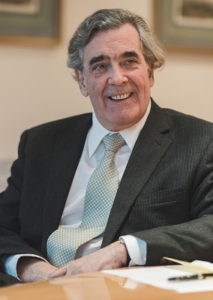Are you willing to contribute to the transformation of society into a better world?
Turning the UNIAPAC’s XXVI World Congress into a place of encounter, sharing and learning is one of the main personal expectations from Rolando Medeiros. In an interview, the President of the International Christian Union of Business Executives claims that business leaders should assume their role “as critical social change agents who contribute to the transformation of society into a better world”. And this Congress is surely a great way to become “a builder of the common good and a promoter of a new humanism of work”
The UNIAPAC operates in 38 countries in the world and has already decades of history. This will be the first world congress under your tenure. What are your main expectations for the upcoming gathering of hundreds of worldwide business leaders in Lisbon?

Rolando Medeiros, President of UNIAPAC
Just the fact that hundreds of business leaders from all corners of the world are gathering to exchange so diverse experiences and backgrounds with a view towards gaining a better understanding of their role as critical social change agents who contribute to the transformation of society into a better world and who are willing to let themselves be inspired and touched, not only by peers but also renowned speakers and panelists from the Christian Churches and the academia, in order to help them in their quest to overcome the split between their faith and their daily business activities, challenges and decisions, is by itself very encouraging. Thus, my main expectation is that Uniapac’s XXVI World Congress turns into a place of encounter, sharing and learning for each and all the attendees and active participants.
“The cornerstone elements to be discussed in this Congress are based on the conviction that business is a vocation, and a noble vocation, that works as a personal challenge to find a new meaning in life and work”, you wrote in the introductory note of the Congress. In a world full of harsh global challenges, with a growing inequality and where the markets still “lead” the way of company’s profitability, how can business leaders embrace this “personal transformation”, disseminate it through all of its stakeholders and still make profits?
In addressing this very important question it needs to be understood first that profit is a result, a consequence: simply an indication that a business is functioning well because the productive factors are being properly employed and corresponding human needs are being duly satisfied. Consequently, profit is not an end in itself but a means which allows the long-term sustainability of the business firm by identifying, as early as possible, root causes —including human and moral factors— affecting it and which are at least equally important for the life of the business.
The personal transformation of the business leaders that UNIAPAC is promoting has to do with this longer-term perspective for them to understand that the purpose of business is not simply to make a profit at any cost and right now; it has to do with the consideration that a business firm is mainly a community of persons which interacts with other persons grouped in several communities of persons which constitute its stakeholders. And a more meaningful comprehension of business success: a business firm consisting of fully motivated and committed members who find a source of flourishing in the workplace; with loyal customers and suppliers who value the long-term mutual benefits they derive from a long-term relationship with it; communities who consider the firm as a good corporate citizen, socially and environmentally responsible; with investors and/or stockholders willing to risk financial resources in this sustainable long-term project; etc. And such a firm is not only sustainable but very profitable too.
Bringing business leaders, prominent academics and church representatives together to debate the “paths” that will lead to a more humane organization, and listening to powerful testimonies of people who really changed the world changing themselves first, is one of the main objectives of this world congress. What were the main premises in choosing not only the subjects of the panels but also the people who will share his insights and life stories with the audience?
The subjects of the panels were informed and inspired by our adopted definition of business as a noble vocation: “Business is a vocation, and a noble vocation, provided that those engaged in it see themselves challenged by a greater meaning in life; this will enable them truly to serve the common good by striving to increase the goods of this world and to make them more accessible to all”.
In this definition three key pillars are distinguished: the personal transformation of the business leader, the building of more humane organizational cultures and businesses serving the common good.
And, as for the panels, the topics will be as it follows:
- “A personal transformation to assume business as a calling”
- “Promoting inclusiveness in business”
- “Inspiring principled business performance”
- “Fostering businesses that impact the common good”
- “Addressing the challenges of the future of work”
In choosing the people for each panel, beyond advocacy of principles and values and the required level of proficiency and expertise, the two guiding principles were diversity and inclusiveness with a view towards a broad representation of world’s geographies (Africa, Asia, Europe, The Americas), backgrounds (business leaders, academics and Church representatives), sexes (spokeswomen and spokesmen), ages (from young adults to old people), races, religions (although the majority profess the Christian faith), etc.
UNIAPAC gathers today Christian Business Leaders Associations in Europe, Latin America, Africa and Asia, representing more than 30,000 active business executives around the world, working in various leading sectors of the world economy. With so much heterogeneity between continents, countries, economies and states of development, what is the main “glue” that keeps UNIAPAC’s member together?
All Uniapac’s Local, National, Regional and International Associations share the goal of promoting amongst business leaders the vision and implementation of an economy that serves people and not the other way around; a mission consisting in the transformation of companies for them truly to contribute to the construction of a more just and humane society by promoting a business model which seeks to place the principles and values of our Christian faith at the heart of business.
We all share the conviction that integral development lies at the core of how business leaders should engage with the community to promote human dignity and the common good. Our shared Vision of the Future is to be recognized worldwide by our distinct promotion of business as a noble vocation.
By assessing the gaps against this common Vision of the Future at each level and defining specific action plans to close these gaps in accordance with each particular circumstance, the degree of development, financial condition, capabilities, etc. the efforts of one association can be useful for some of the others which may face similar challenges.
In this regard, sharing successes and failures, and programs and activities, between the different associations is critical —and is also our hope— to transform the heterogeneity between continents, countries, economies and states of development into synergistic virtuous benefits.
Why the decision to organize this world congress in Lisbon and in collaboration with ACEGE?
Key elements in the decision of organizing this world Congress in Lisbon and in collaboration with ACEGE were the high level of commitment and motivation of ACEGE’s leadership team and the enthusiasm, fervor and conviction with which its members undertake ACEGE’s mission, which, as already mentioned, is fully consistent with Uniapac’s.
In addition, ACEGE is a very well structured association with great organizational capabilities and, thus, able to support and successfully engage in the many challenges that are involved in a congress of this magnitude.
What kind of message would you like to share with our readers and associates to invite them to attend the upcoming world event?
This Congress offers a unique opportunity for an insightful discernment about the critical role a business leader is called to play in today’s society. We have been endowed by God with remarkable acumen in business matters, with valuable talents, privileged knowledge, leadership skills, etc. which can be forces for great good in the world should we see ourselves as serving others and God in our working lives.
Should you are seriously willing to undertake this journey allowing yourself to be challenged by a greater meaning in life and, thus, willing to adopt a broader view of your business leadership role by transcending the quest for short-term profits to become a builder of the common good and a promoter of a new humanism of work, then you cannot miss this Uniapac’s XXVI World Congress to be held in Lisbon, Portugal, on November 22-24, 2018.


